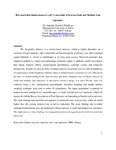How much does labour turnover cost? A case study of Kenyan Small and Medium Tour
Abstract
The hospitality industry is a service-based industry, which is highly dependent on a
customer-focused approach, and a motivated and knowledgeable workforce. Any shift in human
capital therefore is viewed as detrimental as its long term success. Research postulates that
employee mobility is a major cost and leakage of human capital. In addition, studies have shown
that labour turnover affects organizational performance, customer quality and employee
productivity. Despite the adverse effect of labour turnover on growth, survival and sustainability
of organizations in the hospitality industry, there is limited research on turnover costs. This paper
provides an understanding of the turnover rates and direct financial costs of labour turnover in
small and medium tour operators. A descriptive research design was used. Primary data was
collected using a self- administered questionnaire. Stratified sampling and simple random
sampling technique were used to select 30 respondents. The target populations comprised of
human resource managers and owner/managers of small and medium tour operators, which are
registered with the Kenya Association of Tour Operators and operating in Nairobi and its environs.
The study findings indicated that tour operators experienced acute turnover rates, which are much
higher than the average turnover rate in service industries. The study findings also revealed
substantial replacement costs are attributed to labour turnover in small and medium tour operators.
The implications of these findings for managerial practice and suggestions for further research are
discussed.

